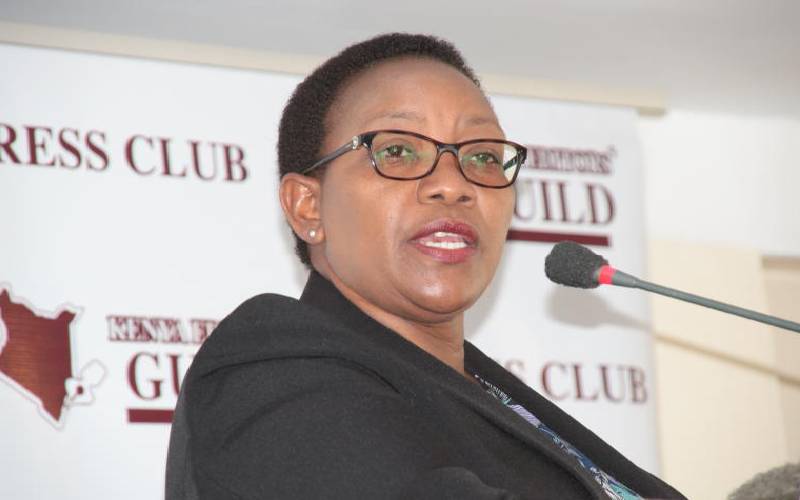
Health Cabinet Secretary Sicily Kariuki has sought to clarify that the government is working to strengthen the health referral system to stop crowding at national referral facilities.
Ms Kariuki acknowledged that weak referral systems are affecting the achievement of Universal Health Coverage, which is one of President Uhuru Kenyatta’s Big Four agenda.
“I must admit that our health systems are weak and have gaps.
One important lesson that we have learnt is that our health system for a long time has been facility-focused, which is part of the problem,” the CS told the Saturday Standard.
In 2018, the government launched an UHC pilot phase in Kisumu, Isiolo, Nyeri and Machakos counties. It has come under sharp criticism, with critics arguing that achieving it will be a tough order.
But the CS states that the ministry is now focusing more on promotional and preventive healthcare as opposed to curative. This, she argues, will reduce the more cases that end up in health facilities.
“The pilot was to gauge the status and we realised the insurance model was not achieving much especially due to gaps at the National Hospital Insurance Fund (NHIF),” she said.
One way to promote health in the grassroots will involve the engagement of 100,000 community health volunteers (CHVs), which the CS says will be put on a uniform stipend across the country. CHVs will educate people about lifestyle choices, food and environmental factors that affect their health and how they can avoid them.
Kariuki says: “This will reduce the number of people having to seek healthcare in facilities.”
She said the referral system remains a bit weak as Kenyans have no confidence in the 4,000 dispensaries and that the ministry is introducing a gate-keeping mechanism where those going to referral facilities must have gone through lower levels of care.
“This move will save time and resources, we shall see reduction of numbers as seen at the Kenyatta National Hospital (KNH) and other referral facilities.”
Ms Kariuki also pointed out that the National Hospital Insurance Fund (NHIF) will be reformed. She said that one in four Kenyans is at risk of financial catastrophe from healthcare expenditure.
The CS added: “The issue at NHIF has been easy-come, easy-go money and this is why we are working to re-position it to cover UHC. Currently, NHIF has 73 schemes that are above the internationally recommended three maximum.”
Currently, every county has its own negotiated agreement.
The health minister said the scheme must be investigated on actuarial soundness, pay-out ratio and sustainability, adding that business processes must also change through a robust ICT system to prevent rampant fraud.
“Today, 15 per cent of the amount NHIF collects goes into administrative expenses way above the maximum three per cent which is best practice yet it only covers only one in five Kenyans,” she said.
On the controversial managed equipment service (MES) that has dogged the ministry since 2015, Kariuki reiterated that no governor is paying for the equipment but the money is paid directly from Treasury through the Ministry of Health to the vendors.
“I state here that there is optimal utilisation with 90 per cent of the equipment operating and have saved three million Kenyans.
“Minimal gaps exist but it must be remembered that it was the work of counties to avail consumables,” she said.
With just three years before the lease expires, Kariuki said that one of the suppliers in the contract stated that Kenya will pay just one dollar as a book donation and then keep the equipment they supplied.
“We are negotiating with other vendors to have such an arrangement; the lifespan of most of these machines ranges from 10 to 15 years and it would make no economic sense returning them to the suppliers,” she said.
 The Standard Group Plc is a multi-media organization with investments in media
platforms spanning newspaper print
operations, television, radio broadcasting, digital and online services. The
Standard Group is recognized as a
leading multi-media house in Kenya with a key influence in matters of national
and international interest.
The Standard Group Plc is a multi-media organization with investments in media
platforms spanning newspaper print
operations, television, radio broadcasting, digital and online services. The
Standard Group is recognized as a
leading multi-media house in Kenya with a key influence in matters of national
and international interest.











